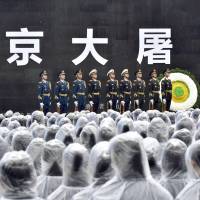China held a memorial ceremony Tuesday for victims of the 1937 massacre committed by Japanese troops in Nanjing, as the two countries have been pushing to improve relations overshadowed for years by territorial and wartime issues.
This year's state commemoration took place two weeks before Prime Minister Shinzo Abe's planned visit to Pearl Harbor to honor those killed in the Japanese surprise attack there in 1941, which pulled the U.S. into World War II.
Japanese troops' killing of a large number of civilians before they took control of the then-Chinese capital, when it was known as Nanking, and during the weeks that followed remains a very delicate issue in the frequently tense ties between the two countries.
After Abe announced his plan to visit the site of the Pearl Harbor attack with U.S. President Barack Obama during a trip to Hawaii on Dec. 26 and 27, China said it too has ideal places for Japanese political leaders to pay respects, and cited the massacre's memorial hall in Nanjing as one of them.
China says more than 300,000 people were massacred.
Those who attended Tuesday's event included survivors, government officials, soldiers and students.
China held its first state observance of the tragedy in 2014 at the same location, presided over by President Xi Jinping, after it designated Dec. 13 as a national memorial day for the victims.
Japanese and Chinese historians remain divided on the number of victims and their differences of opinion have complicated reconciliation efforts.
Japanese historians have estimated that the number of Chinese civilians and soldiers killed by the Japanese military ranges from tens of thousands to 200,000.
In the most extreme cases, some nationalistic Japanese politicians and scholars deny a massacre even took place.



